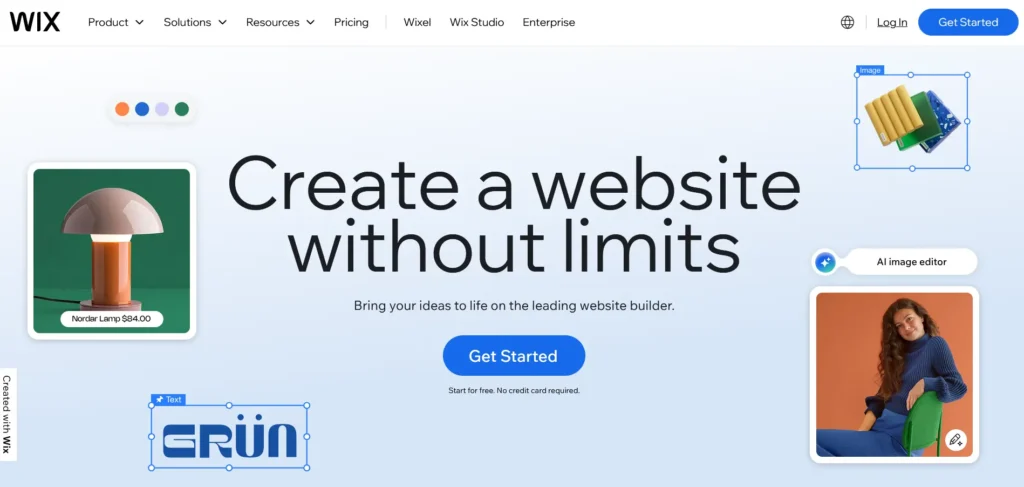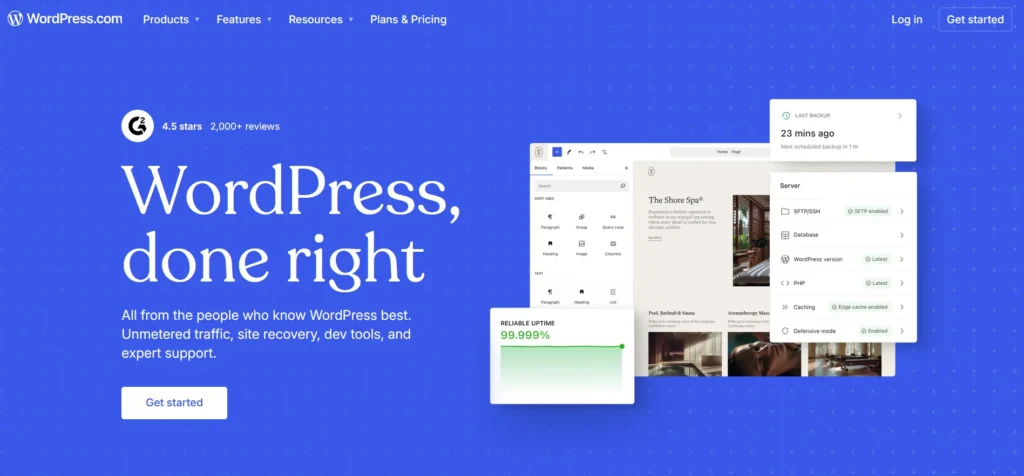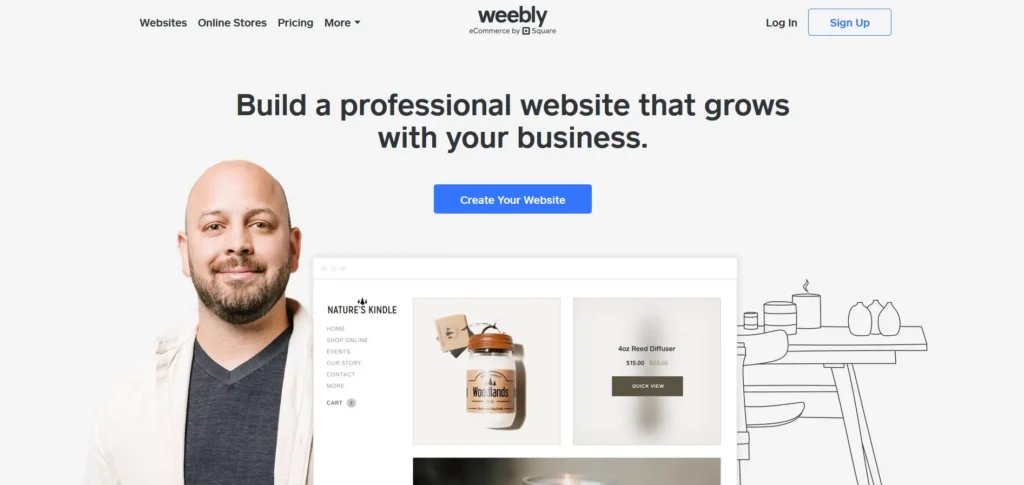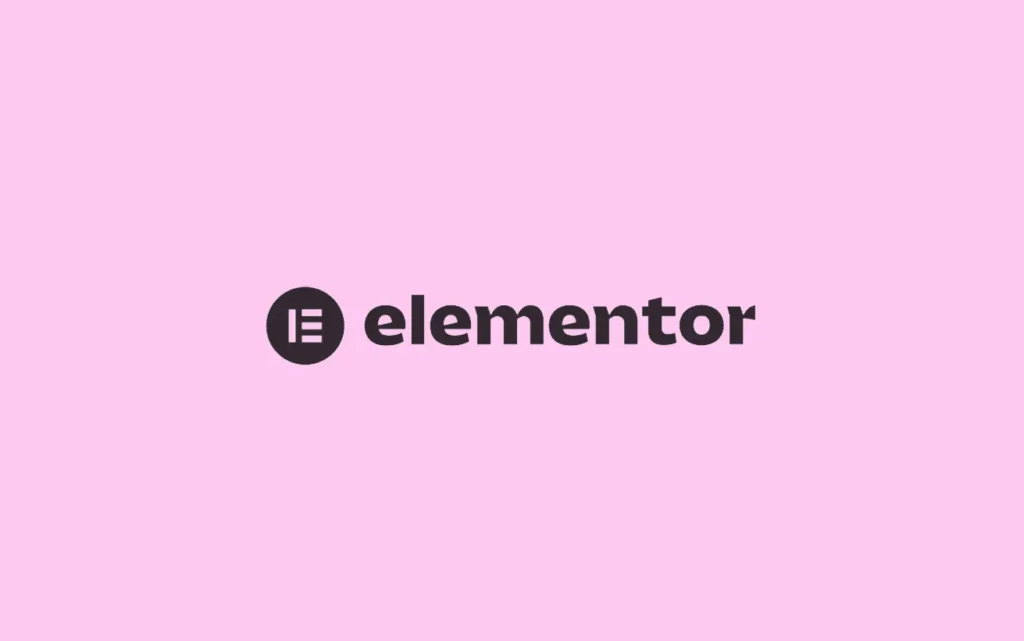Top Website Builders 2025: Choosing the Best Website Builders for a Strong Online Presence
In 2025, a website is no longer merely a digital placeholder or a static collection of pages—it has become a fundamental tool for establishing credibility, building professional identity, and driving business growth. The best website builders now empower anyone to create a polished, fully functional site without coding expertise, while the top website builders integrate AI, analytics, and responsive design to meet evolving audience expectations.
Modern users expect not only information but also engagement, seamless functionality, and alignment with broader digital ecosystems. A well-built website—crafted with one of the top website builders—reflects professionalism, brand reliability, and adaptability to technological standards. For individuals and organizations alike, an effective online presence directly correlates with trust, reputation, and measurable success in today’s competitive digital landscape.
Why a Website Today is More Than Just a Page
Social Credibility: A well-designed website signals legitimacy. Users are more likely to trust professionals, freelancers, and businesses that maintain a polished online presence. In an age where misinformation and scams proliferate, a professional website establishes authority and reassures visitors of authenticity.
Professional Image: Beyond credibility, a website serves as a digital portfolio or storefront. For businesses, it represents branding consistency; for individuals, it showcases skills, achievements, and thought leadership. High-quality visuals, clear messaging, and responsive design reinforce a professional image that competitors may lack.
Business Success: Websites have evolved into active drivers of growth. Features such as e-commerce capabilities, lead generation forms, and appointment scheduling allow businesses to convert visitors into customers directly. Even for non-commercial users, a website enhances networking opportunities, partnership potential, and visibility in a competitive environment.
Key Trends for 2025: How the Top Website Builders and Best Website Builders Are Shaping the Future
AI-Assisted Design: The best website builders in 2025 now feature powerful AI-assisted design tools. Artificial intelligence drives layout suggestions, automated content creation, and real-time user personalization. These innovations allow websites built with the top website builders to adapt dynamically to user behavior—reducing the need for manual design or coding expertise.
Interactive Elements: Modern websites created with the best website builders increasingly include interactive features such as live chat, quizzes, polls, and dynamic animations. These elements enhance engagement, keep visitors on-site longer, and encourage conversions by creating a more immersive user experience.
Integration with Social Platforms: The top website builders of 2025 seamlessly integrate websites with social media, messaging apps, and third-party tools. Features like social feeds, sharing options, and single sign-on capabilities help maintain a cohesive digital presence, boosting engagement and strengthening a brand’s visibility across multiple platforms.
The Importance of Choosing the Right Tool: How the Top Website Builders and Best Website Builders Make a Difference
Selecting the right platform for website creation is critical to maximizing efficiency, usability, and functionality. The best website builders simplify the process, offering intuitive tools that save time and enhance performance, while the top website builders provide advanced features that support long-term growth and scalability.
Time Efficiency: The top website builders streamline setup and deployment, enabling faster website launches without sacrificing quality—ideal for small businesses and independent professionals with limited technical resources.
Simplicity: The best website builders feature intuitive drag-and-drop interfaces and AI-powered automation, reducing the learning curve and allowing users to focus on content and strategy rather than technical complexity.
Functionality: Beyond design, the chosen platform should support analytics, SEO optimization, security, and third-party integrations. The top website builders balance simplicity with robust capabilities, ensuring scalability and adaptability to evolving digital trends.
Wix – Creativity with Artificial Intelligence
Wix, one of the leading website creation platforms, continues to evolve in 2025, integrating advanced artificial intelligence (AI) tools to streamline design and enhance creativity. The platform has become a versatile solution for individuals, freelancers, and small businesses who seek to establish a professional online presence without deep technical knowledge. Its AI-driven capabilities allow users to create visually engaging and functional websites quickly, while retaining the flexibility to customize designs according to personal or brand preferences.
Wix – Pros and Cons
Pros of the Wix
- Easy drag-and-drop editor; no coding needed
- Large template library and AI-assisted design
- Hosting, security, and maintenance included
- Good for portfolios, blogs, and small businesses
- Basic e-commerce and marketing tools built-in
Cons of the Wix
- Limited flexibility once a template is chosen
- Less scalable for large or complex sites
- SEO and advanced optimization not as robust as competitors
- Premium plans needed for full features
- Migration to other platforms can be difficult
AI Design Assistance
A standout feature of Wix in 2025 is its AI-assisted design functionality. This system automatically generates website layouts based on the user’s content, goals, and industry type. By analyzing uploaded text, images, and videos, the AI proposes structure, color schemes, typography, and element placement optimized for readability, engagement, and aesthetic appeal. Users can further refine these suggestions with simple drag-and-drop adjustments, significantly reducing the time and effort required to build a professional website. This approach benefits not only beginners with limited design experience but also experienced users seeking rapid prototyping and creative inspiration.
New Visual Features
Wix has introduced a range of modern visual enhancements to support interactive and dynamic web experiences:
- Animations: Subtle animations for buttons, text, and images allow for smoother transitions, guiding users’ attention and improving the overall flow of the website.
- Interactive Elements: Features such as galleries, sliders, pop-ups, and hover effects make websites more engaging and encourage visitors to explore content actively.
- Scrolling Effects: Advanced scrolling effects, including parallax backgrounds, reveal animations, and fixed sections, enhance visual storytelling and create a more immersive browsing experience.
These features are designed to enhance engagement without requiring advanced coding skills, enabling users to deliver visually compelling websites that feel modern and responsive.
Practical Tips for Quick Website Creation
Wix’s AI-powered tools and intuitive interface make it possible to build a professional portfolio website or personal blog efficiently. Key recommendations include:
- Start with AI Suggestions: Upload your content and let Wix’s AI generate a draft layout. This provides a solid starting point and reduces design decision fatigue.
- Focus on Visual Consistency: Use the platform’s pre-designed color palettes, fonts, and image layouts to maintain a cohesive professional look.
- Leverage Interactive Features Wisely: Include interactive elements such as galleries, contact forms, and animations strategically, ensuring they enhance usability rather than distract visitors.
- Optimize for Mobile: Wix automatically adapts designs for mobile, but it’s important to review and tweak elements to ensure readability and engagement on smaller screens.
- Iterate and Update: AI suggestions can be adjusted at any time, allowing users to refine their website as content evolves or new trends emerge.
By combining AI assistance with modern visual features, Wix in 2025 enables users to create websites that are both aesthetically appealing and functional, supporting professional branding and personal expression efficiently.
Squarespace – Minimalist Elegance with Advanced Features
Squarespace has long been recognized for its elegant, minimalist design philosophy, which prioritizes aesthetics, usability, and visual storytelling. In 2025, the platform continues to evolve, combining this signature style with advanced tools and AI-powered enhancements, making it particularly appealing for creative professionals, small businesses, and anyone seeking a high-end online presence. Squarespace emphasizes both design sophistication and functional capability, allowing users to present content in a visually compelling yet streamlined manner.
Squarespace – Pros and Cons
Pros of the Squarespace
- Elegant, minimalist templates with AI-assisted “Smart Layouts”
- Advanced e-commerce: AI recommendations, automated discounts
- Ideal for creative professionals and portfolios
- Responsive and visually consistent across devices
- Integrated analytics and marketing tools
Cons of the Squarespace
- Less flexible for heavy customization compared to open platforms
- Higher learning curve than simple drag-and-drop builders
- Premium plans required for full e-commerce features
- Limited template switching without redesigning content
- Can be more expensive for large-scale sites
2025 Template Innovations
Squarespace’s templates in 2025 have incorporated “Smart Layouts,” a significant innovation in automated design. These layouts use AI to adapt page structure, spacing, and visual hierarchy according to the type and amount of content added. For example:
- Adaptive content organization: Images, text blocks, and media are automatically repositioned to maintain balance and readability.
- Responsive design enhancements: Smart layouts optimize for all screen sizes, ensuring a consistent and professional appearance on desktops, tablets, and smartphones.
- Design consistency: AI-driven suggestions maintain font pairing, color harmony, and alignment across pages without manual adjustment.
These features allow users to create polished, professional-looking websites rapidly, while preserving the minimalist aesthetic Squarespace is known for.
Integration with the Latest E-Commerce Technologies
Squarespace has also expanded its e-commerce capabilities, integrating advanced technologies to facilitate business operations:
- AI product recommendations: The platform can suggest related products or content to visitors, increasing engagement and potential sales.
- Automated discounts and promotions: Businesses can configure rules for time-sensitive offers, bulk discounts, or loyalty rewards, which are applied automatically.
- Seamless payment and inventory management: Integration with major payment processors and inventory tracking ensures smooth operations without third-party complexity.
- Analytics and customer insights: AI tools analyze visitor behavior, allowing users to make data-driven adjustments to products, layouts, and marketing strategies.
This combination of automated marketing and operational tools positions Squarespace as a strong choice for boutique e-commerce stores, creative shops, and service-based businesses.
Tips: Creating a Premium Image for Creative Professionals
Squarespace’s tools are particularly suited for creative professionals aiming to present a high-end, polished brand image online. Key recommendations include:
- Leverage visual storytelling: Use full-width images, galleries, and video backgrounds to showcase your portfolio or projects.
- Maintain design simplicity: Stick to clean lines, consistent typography, and minimalistic layouts to emphasize content over clutter.
- Utilize AI-assisted layouts: Allow smart layouts to structure pages efficiently, then fine-tune details to align with your brand aesthetic.
- Integrate e-commerce subtly: For creatives selling prints, services, or digital products, add elegant storefronts or booking systems without overwhelming the portfolio.
- Optimize for mobile and speed: Ensure images and media are optimized for fast loading on all devices, preserving a premium user experience.
By combining minimalist design, AI-assisted layout tools, and integrated e-commerce features, Squarespace in 2025 enables users to create visually stunning, highly functional websites that communicate professionalism and creativity effectively.
WordPress.com – A Powerful Platform for Growing Businesses
WordPress.com has long been a leading platform for websites, blogs, and e-commerce, known for its flexibility, scalability, and extensive ecosystem. In 2025, it continues to evolve to support growing businesses and professional creators by integrating AI-powered tools, modern design templates, and enhanced plugin capabilities. Its strength lies in combining user-friendly interfaces with advanced customization options, making it suitable for both beginners and experienced users who plan to scale their online presence.
WordPress – Pros and Cons
Pros of the WordPress
- Flexible, scalable platform for blogs and businesses
- AI-assisted content creation and SEO tools
- Modern, responsive templates
- Extensive plugin ecosystem: chatbots, newsletters, e-commerce
- Strong analytics and third-party integrations
Cros of the WordPress
- Can be complex for beginners compared to simpler builders
- Requires careful plugin management to avoid performance issues
- Some advanced features require premium plans
- Customization can be limited on certain plans
- Larger sites may need technical knowledge for optimal scaling
New Features for 2025
WordPress.com in 2025 introduces several new features designed to streamline content creation, enhance design, and optimize performance:
- AI Content Creation: AI tools now assist in generating text, meta descriptions, product descriptions, and even blog posts. This reduces content production time while maintaining quality, helping businesses keep their websites fresh and engaging.
- SEO Optimization Tools: Integrated AI-driven SEO recommendations guide users on keyword usage, link structure, readability, and metadata, improving search engine visibility without requiring expert knowledge.
- Modern Design Templates: A wide range of professionally designed templates are available, optimized for mobile responsiveness, speed, and accessibility. Templates cater to different industries and website types, from portfolios to e-commerce stores.
These features allow users to launch a professional-looking, SEO-friendly site more efficiently while maintaining control over design and content.
Plugin and Integration Innovations
WordPress.com’s ecosystem of plugins and integrations remains one of its strongest advantages. In 2025, innovations include:
- AI Chatbots: Plugins can now provide automated customer support, answer common questions, and engage visitors in real-time.
- Automated Newsletters: Integration with marketing tools allows for automated email campaigns, segmentation, and performance tracking.
- E-commerce Enhancements: Advanced store management plugins provide inventory control, payment gateways, and personalized product recommendations.
- Analytics and Reporting: Integrated analytics plugins allow businesses to track traffic, conversions, and user behavior, enabling data-driven decisions.
Third-Party Integrations: WordPress.com supports seamless integration with social media platforms, CRMs, and other SaaS tools for a connected digital ecosystem.
This extensive plugin ecosystem allows WordPress.com websites to scale from small personal blogs to full-featured online businesses.
Tips: Growing a Blog or Online Store from Scratch
- Plan Content Strategy: Identify your target audience, topics, and posting schedule. Use AI-assisted tools to draft and optimize posts for engagement and SEO.
- Choose the Right Template: Select a modern, responsive template that aligns with your brand and purpose—portfolio, blog, or store.
- Leverage Plugins Wisely: Add only necessary plugins to avoid performance issues; prioritize tools for SEO, analytics, e-commerce, and marketing.
- Optimize for SEO and Performance: Use AI SEO recommendations, optimize images, and implement caching and speed tools to improve visibility and user experience.
- Engage Visitors: Use chatbots, automated newsletters, and social media integration to nurture leads, encourage repeat visits, and build a loyal audience.
- Iterate and Scale: Regularly review analytics to refine content, product offerings, and user experience. Gradually add features as the business or blog grows.
By combining AI content assistance, modern templates, and powerful plugin integrations, WordPress.com in 2025 offers a scalable, professional platform for individuals and businesses looking to grow their online presence effectively.
Weebly – Simple Start, Fast Success
Weebly, known for its ease of use and accessibility, continues to be a popular choice for beginners, small businesses, and individuals seeking to establish an online presence quickly. In 2025, Weebly emphasizes simplicity, speed, and functionality, enabling users to create professional websites without requiring technical expertise. Its streamlined tools and integrations make it particularly appealing for users with limited time or resources who want to achieve a polished online image.
Weebly – Pros and Cons
Pros of the Weebly
- Very easy drag-and-drop interface, beginner-friendly
- One-page and simple website creation for fast launch
- Social media integration for wider reach
- Mobile-responsive templates included
- Quick setup with minimal technical knowledge
Cros of the Weebly
- Limited advanced customization and scalability
- Fewer design and plugin options compared to competitors
- Not ideal for large or complex e-commerce sites
- Some features require paid plans
- Less flexibility for growth beyond simple websites
New Features for 2025
-
Integration with Social Media:
Weebly now offers enhanced social media integrations, allowing users to embed feeds, connect share buttons, and manage posts directly from the website platform. This helps small businesses and individuals maintain an active online presence and increase engagement across multiple channels. -
One-Page Website Creation:
A new feature for 2025 enables users to create fully functional one-page websites efficiently. These compact, scrollable layouts are ideal for portfolios, personal projects, or small business landing pages, offering a professional look while simplifying navigation. -
AI Assistance and Templates:
While maintaining simplicity, Weebly’s templates have been updated to include AI-powered layout suggestions and mobile optimization, helping users quickly achieve modern designs without manual adjustments.
How Small Businesses and Beginners Can Achieve a Professional Image
Weebly’s design philosophy and features allow even users with no technical background to present a credible, professional online presence:
- Pre-designed Templates: Professionally designed templates ensure a polished aesthetic from the start.
- Drag-and-Drop Builder: Intuitive interface allows easy placement of images, text, videos, and forms without coding.
- Branding Tools: Custom logos, color schemes, and fonts can be applied quickly, maintaining brand consistency.
- Responsive Design: All templates are automatically optimized for desktop, tablet, and mobile viewing, ensuring a professional experience across devices.
- Built-in Analytics: Users can monitor visitor behavior and adjust content or design to improve engagement and business outcomes.
Tips: Quick Launch with Minimal Resources
- Select a Template That Matches Your Goal: Start with a layout suited for your business, portfolio, or personal project. This reduces the time spent customizing structure.
- Use One-Page Layouts for Simplicity: Focus content on key offerings or projects; one-page designs allow fast creation and easy navigation.
- Leverage Social Media Integration: Connect accounts to embed feeds or share buttons, expanding reach without additional platforms.
- Add Essential Elements Only: Include key sections like contact forms, service descriptions, and testimonials to maintain professionalism while avoiding clutter.
- Optimize for Mobile: Ensure images and text are readable on all devices; Weebly’s automatic mobile optimization simplifies this step.
- Iterate Gradually: Start with core content, then expand features or pages as resources and confidence grow.
By combining simplicity, social integration, and fast deployment features, Weebly in 2025 allows beginners and small business owners to achieve a professional online presence efficiently, without requiring extensive technical knowledge or resources.
Website Design Trends for 2025
As digital experiences continue to evolve, 2025 brings a set of design trends that reflect the growing importance of interactivity, personalization, and seamless integration with broader digital ecosystems. Modern websites are expected to engage visitors actively, adapt to their devices, and leverage AI and social platforms to maximize reach and usability. Understanding these trends helps businesses, creators, and individuals make informed decisions about website strategy and tools.
Interactive Design
Interactive design has become a key component of modern web experiences. Features like animations, parallax scrolling, and AI-recommended design elements increase engagement and enhance user experience:
- Animations: Smooth transitions for buttons, text, and images guide the visitor’s attention, improving usability and retention. Subtle motion can make a site feel more dynamic without overwhelming the user.
- Parallax Effects: Layered scrolling effects create depth, offering a more immersive browsing experience. Parallax can also be used strategically to highlight important content or storytelling elements.
- AI-Recommended Elements: Modern platforms now use AI to suggest layouts, color schemes, and content placements based on user behavior and content type. This personalization ensures design consistency and can increase conversion rates.
Interactive elements are no longer optional; they are critical for engaging users and encouraging exploration of content or products.
Mobile-First Design
Mobile-first design is increasingly essential in 2025, as mobile devices account for the majority of web traffic globally:
- Responsive Layouts: Websites must adapt seamlessly to different screen sizes, maintaining readability, navigation, and visual appeal.
- Performance Optimization: Mobile-first design emphasizes lightweight images, fast loading times, and minimal clutter to improve user experience and reduce bounce rates.
- Touch-Friendly Interactions: Buttons, menus, and forms need to be designed for touch interfaces, making mobile usability as smooth as desktop navigation.
Designing for mobile first ensures accessibility, improves SEO performance, and aligns with user behavior trends.
Integration with Social Platforms and AI
Integration with social media and AI tools has become central to website strategy:
- Social Platform Integration: Embedding feeds, sharing buttons, and login options allows users to interact with a brand across multiple channels, increasing engagement and reach.
- AI-Driven Personalization: AI can recommend content, products, or layout adjustments in real time based on visitor behavior, enhancing user experience and boosting conversions.
- Marketing Automation: AI and social integrations can streamline campaigns, automate newsletter distribution, and track engagement metrics without manual effort.
These integrations make websites more than static pages; they become dynamic, interactive hubs connected to a broader digital ecosystem.
Reader Tips: Choosing the Right Tool Based on Goals and Budget
Selecting a website creation platform or tool depends on objectives, resources, and expected growth:
- Define Your Goals: Identify whether the website is for portfolio display, e-commerce, blogging, or a business landing page. Different goals require different levels of functionality and flexibility.
- Assess Technical Skill: Beginners may prefer drag-and-drop builders like Wix, Weebly, or Squarespace, while advanced users may opt for WordPress.com for customization and scalability.
- Consider Budget: Free plans may suffice for small portfolios, but e-commerce and advanced integrations usually require paid subscriptions.
- Evaluate Features: Ensure the platform supports interactivity, mobile responsiveness, SEO, AI tools, and social integration relevant to your objectives.
- Plan for Growth: Choose a tool that allows gradual expansion—adding pages, features, or products without requiring a complete redesign.
By understanding the key trends and aligning them with goals and resources, users can create modern, effective websites that engage visitors, perform well across devices, and remain adaptable to future changes.
Comparative Table: Which Tool Is Right for You?
|
Platform
|
Design Freedom
|
Functionality
|
AI Integration
|
Typical Price*
|
Ease of Use
|
|---|---|---|---|---|---|
|
Wix
|
Very high – drag‑and‑drop, free‑placement elements, large template/app marketplace.
|
Strong – built‑in e‑commerce, apps, marketing tools.
|
Good – AI site builder (ADI), AI tools for content/design.
|
Moderate to high (entry plans ~US$15‑30/month; advanced tiers much more)
|
Very beginner‑friendly – among the easiest to start with.
|
|
Squarespace
|
Medium to high – very polished templates, but less free‑form customization than Wix.
|
Good – built‑in blogging, portfolio, e‑commerce features.
|
Moderate – AI/design suggestions, but less heavily marketed than Wix.
|
Moderate (entry plans ~US$16‑28/month)
|
Quite user‑friendly, though slightly steeper than the simplest builders.
|
|
WordPress.com
|
Very high (especially when using plugins/themes) – unlimited customization potential with technical skill.
|
Very high – extensive plugins, full CMS, great for blogs/e‑commerce when configured.
|
Good – AI content/SEO tools increasingly built in.
|
Varies widely – from low entry cost to higher depending on hosting/themes/plugins.
|
More complex – steeper learning curve, especially for full customization.
|
|
Weebly
|
Lower than the others – simple drag‑and‑drop, fewer advanced customization options.
|
Moderate – good for small business/basic e‑commerce, but less feature‑rich.
|
Basic – fewer advanced AI integrations discussed in recent comparisons.
|
Lower cost (entry plans around US$6‑12/month)
|
Very easy – among the easiest for beginners and smallest sites.
|
*Prices are approximate and may vary by region, billing period, and current promotions.
Quick “Recommended Choice” Based on Needs
Here are my recommendations based on typical user needs:
- Creatives (photographers, designers, portfolios):
Choose Squarespace if you want elegant, minimalist design with minimal fuss. If you want more freedom and customization, choose Wix. - Small to medium businesses / growing e‑commerce or service businesses:
Wix is a strong choice because of its broad functionality and lower barrier to entry. WordPress.com is ideal if you anticipate needing greater scalability and custom control down the road. - Personal blogs / content‑focused sites:
WordPress.com is the best fit if you are comfortable learning a bit and plan to grow content over time. Wix or Squarespace are fine for simpler blogs with less technical overhead. - Very small businesses or beginners with minimal budget and need for simplicity:
Weebly is a viable choice if your site is straightforward and you want to launch quickly with minimal resources.
Conclusion
In 2025, the best website builders have evolved far beyond simple page creation tools. They now offer sophisticated, AI-assisted features, interactive design capabilities, and seamless integration with social platforms—empowering individuals and businesses to establish a professional online presence quickly and efficiently. Whether for a personal blog, creative portfolio, or e-commerce store, these top website builders reduce the technical barriers that once limited website creation, making it accessible to beginners while still offering advanced functionality for experienced users.
Recommendation
When choosing among the best website builders, your decision should be guided by your goals and intended use, rather than popularity alone. Different platforms excel in different areas:
- Wix provides flexibility and design freedom for creative and small business projects.
- Squarespace emphasizes polished, minimalist design ideal for portfolios and visual storytelling.
- WordPress.com offers scalability and advanced functionality for blogs, businesses, and larger websites.
- Weebly enables rapid setup for small projects with minimal technical effort.
Matching the platform’s strengths to your objectives ensures a more effective and satisfying website-building experience.
Reader Inspiration
With the top website builders of 2025, anyone can experiment with the latest design trends, AI-powered personalization, and interactive features. Even beginners can start building immediately, refining their site as skills and goals evolve. The key takeaway: start now, explore, and adapt—every website you build is an opportunity to learn, grow, and make an impact in the digital world.
By understanding the latest trends, leveraging AI, and selecting from the best website builders, you can create a professional, engaging online presence that fulfills both personal and business objectives.







